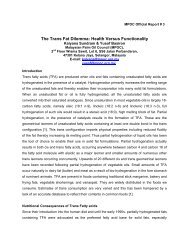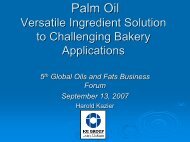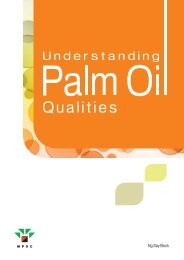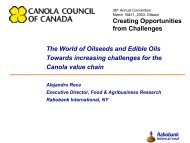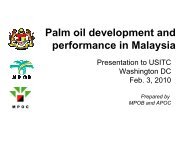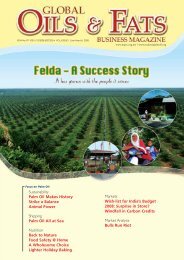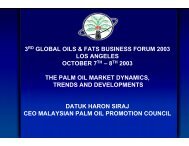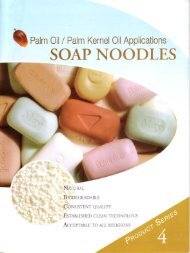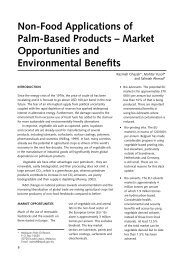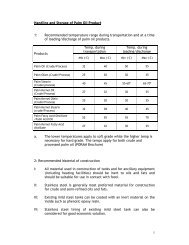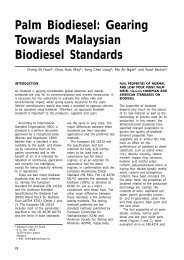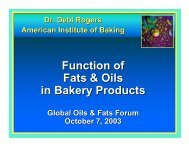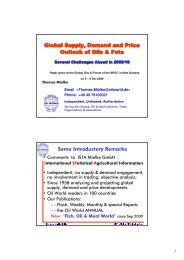Create successful ePaper yourself
Turn your PDF publications into a flip-book with our unique Google optimized e-Paper software.
Fortunately, a breakthrough in research at MPOB<br />
enabled futher development of technology to<br />
produce winter-grade fuel. This provided more<br />
assurance of the feasibility for commercialisation.<br />
A Detailed Feasibility Study was carried<br />
out before deciding on<br />
commercialisation. This not only<br />
evaluated the technology in detail in<br />
relation to yield of reactors, but also the<br />
marketing potential of the products and<br />
co-products and their prices. In this way,<br />
the revenue streams from the project<br />
could be projected.<br />
The return of investment was calculated,<br />
based on cost of investment in the plants<br />
and revenue to be generated from output.<br />
Interestingly, the integrated project of<br />
bio-diesel production combined<br />
with carotene and Vitamin E<br />
extraction gave an IRR of<br />
more the 40%, but the<br />
project investors did not<br />
want to proceed with<br />
commercialisation at that<br />
time.<br />
Problems with the<br />
suitability of palm bio-diesel<br />
for use in cold countries had to<br />
be solved. Fortunately, a<br />
breakthrough in research at MPOB<br />
enabled further development of<br />
technology to produce winter-grade fuel.<br />
This provided more assurance of the<br />
feasibility for commercialisation.<br />
Research was intensified to improve<br />
project viability. For example, in addition<br />
to the winter-grade fuel, the same project<br />
can be commercialised to generate<br />
carotene, vitamins, sterols, oleochemicals<br />
and surfactants for high quality<br />
detergence as co-products.<br />
The use of a venture-capital approach<br />
spurred commercialisation as well. In a<br />
new industry, it is difficult for the banks<br />
to approve loans, as there are no<br />
precedents of bio-diesel plants in<br />
Malaysia.<br />
For a while, construction was limited. A<br />
breakthrough suggestion was for MPOB<br />
to construct three moderate size plants of<br />
60,000 tonnes/year capacity each, and<br />
lease these to partners who would provide<br />
ancillary facilities such as land, tanks and<br />
office buildings.<br />
Banks then began approving loans to other<br />
bio-diesel investors, and became more<br />
confident after noting that the<br />
government has made substantial<br />
commitment to financially<br />
invest in bio-diesel projects.<br />
MPOB’s commitment in<br />
building and leasing the<br />
three plants using its<br />
own technology inspired<br />
many investors to further<br />
invest in bio-diesel<br />
production by constructing<br />
plants.<br />
However, the eventual number of<br />
plants to be constructed by licenceholders<br />
will depend on how the price of<br />
palm oil responds. If it escalates, the profit<br />
margin will be much reduced and biodiesel<br />
investment will slow down.<br />
Dr Yusof Basiron<br />
CEO, MPOC<br />
GLOBAL OILS & FATS BUSINESS MAGAZINE •VOL.3 ISSUE 3, 2006 13



